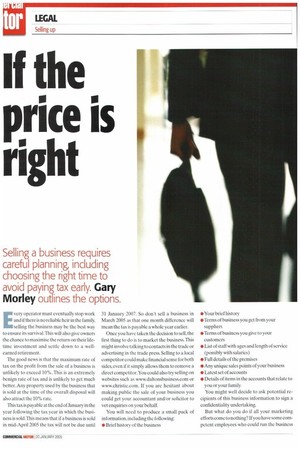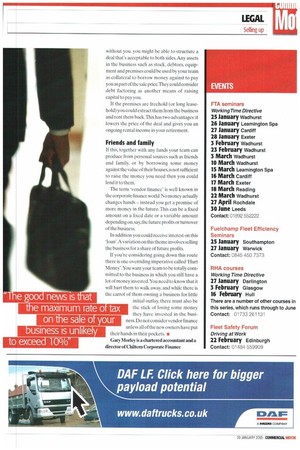If the price is right
Page 38

Page 39

If you've noticed an error in this article please click here to report it so we can fix it.
Selling a business requires careful planning, including choosing the right time to avoid paying tax early. Gary
Morley outlines the options.
Every operator must eventually stop work and if there is no reliable heir in the family, selling the business may be the best way to ensure its survival.This will also give owners the chance to maximise the return on their lifetime investment and settle down to a we IIearned retirement.
The good news is that the maximum rate of tax on the profit from the sale of a business is unlikely to exceed 10%. This is an extremely benign rate of tax and is unlikely to get much better. Any property used by the business that is sold at the time of the overall disposal will also attract the 10% rate.
This tax is payable at the end of January in the year following the tax year in which the business is sold.This means that if a business is sold in mid-April 2005 the tax will not be due until 31 January 2007. So don't sell a business in March 2005 as that one month difference will mean the tax is payable a whole year earlier.
Once you have taken the decision to sell, the first thing to do is to market the business. This might involve talking to contacts in the trade or advertising in the trade press. Selling to a local competitor could make fmancial sense for both sides, even if it simply allows them to remove a direct competitor. You could also try selling on websites such as wwwdaltonsbusiness.com or www.christie.com. If you are hesitant about making public the sale of your business you could get your accountant and/or solicitor to vet enquiries on your behalf.
You will need to produce a small pack of information, including the following: • Brief history of the business without you. you might be able to structure a deal that's acceptable to both sides. Any assets in the business such as stock, debtors, equipment and premises could he used by your team as collateral to borrow money against to pay you as part of the sale price.They could consider debt factoring as another means of raising capital to pay you.
If the premises are freehold (or long leasehold) you could extract them from the business and rent them back.This has two advantages: it lowers the price of the deal and gives you an ongoing rental income in your retirement.
Friends and family Ii this, together with any funds your team can produce from personal sources such as friends and family, or by borrowing some money against the value of their houses, is not sufficient to raise the money you need then you could lend it to them.
The term 'vendor finance' is well known in the corporate finance world. No money actually changes hands instead you get a promise of more money in the future. This can be a fixed amount on a fixed date or a variable amount depending on, say, the future profits or turnover of the business.
In addition you could receive interest on this loan' .A variation on this theme involves selling the business for a share of future profits.
If you're considering going down this route there is one overriding imperative called 'Hurt Money'.You want your team to be totally committed to the business in which you still have a lot of money invested.You need to know that it will hurt them to walk away and while there is the carrot of them owning a business for little initial outlay, there must also be the stick of losing some money they have invested in the business. Do not consider vendor finance unless all of the new owners have put their hands in their pockets. • Gary. Morley is a chartered accountant and a director of Chiltern Corporate Finance












































































































































































































